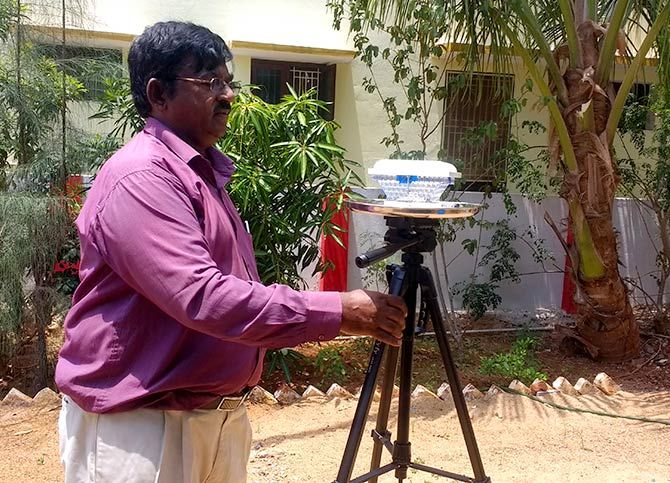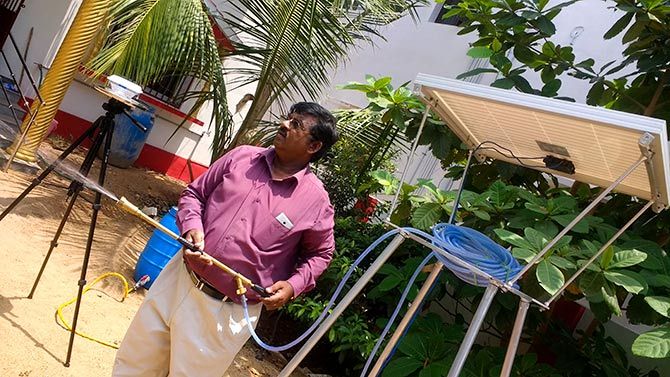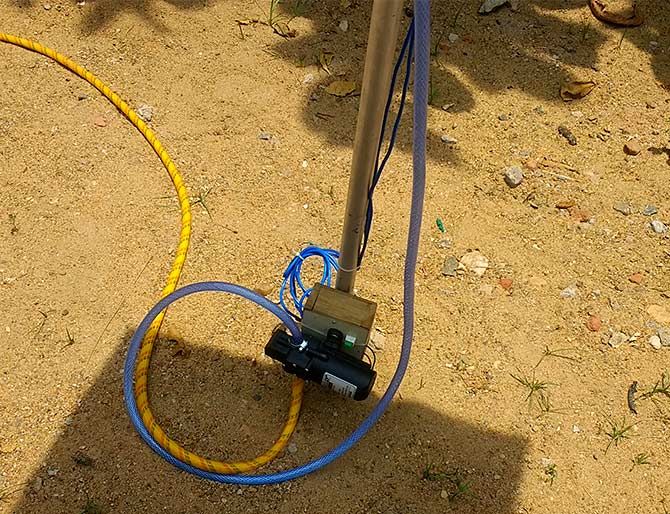When faced with problems, this babu came up with innovative solutions, discovers Rediff.com's A Ganesh Nadar.

In government offices, from Kashmir to Kanyakumari, babus usually provoke citizens' ire.
By their indifference to solving the citizenry's problems, by their often callous conduct, by their refusal to do what they are paid to.
In this ocean of bureucratic insensitivity and sloth, some souls stand out.
P David Rajah Beula, for instance.
Beula joined as an agricultural officer in 1983 and retired in March 2017 as Tamil Nadu's deputy director for agriculture.
In 2008, when he was posted in Villupuram, north Tamil Nadu, the state was reeling from a water shortage.
Beula advised the farmers to plant brinjals instead of the water-intensive rice crop. He convinced them to use drip irrigation as well.
Just as the brinjal crop was maturing, it was attacked by bore worms.
"I suggested they put up a light at night and keep a plate with castor oil mixed with a few drops of shampoo below it," he recalls.
"The first day, there were a lot of dead insects in this liquid. The next day, the number of dead insects reduced. On the third day, the number was negligible."
Then, he made them shift the light, which switched on automatically at night, to another part of the field.
As a result, the amount that the farmers spent on pesticide reduced by half, from ₹10,000 to ₹5,000 per acre.
Besides, the farmers got a very good yield.

This was Beula's first brush with innovation.
He then tried the same strategy with jasmine farmers.
Bud worms were preventing the flower from blooming. Once again, the night light worked its magic and the insects vanished.
But the Tamil Nadu Electricity Board objected. 'Free power' was being offered only for the water pumps and 'could not be used to light up the fields at night.'
If the farmers continued to do so, the TNEB threatened, power would be cut.
Beula, who has a master's degree in agriculture and a diploma in management of soil fertility from Denmark, was not fazed by this setback. He decided to deploy a solar-powered lamp instead.

In 2014, when he was posted in Tirunelveli, southern Tamil Nadu, he was approached by a worried jasmine farmer.
The water in the farmer's well could be used for only half an hour a day and he was sure the well would go dry within a fortnight.
The jasmine crop is perennial, but demands a lot of water.
"I invented a portable solar water pump which is connected to a spray hose. It can be attached to a barrel of water and runs on 20 watts of power that is generated though a 3 feet x 3 feet solar panel," he says.
When the rains fail, he recommends this method to the farmers.
"I asked the farmer to spray a limited amount of water on the jasmine plant. I also told him to spread dead plant fibre on the soil around the plant to reduce evaporation."
"Lightning breaks up the nitrogen molecules in the air which fall on the soil when it rains and combines with its minerals to form nitrates, which is a kind of fertiliser," explains Beula.
"When we use my spray method, we add liquid fertiliser to the water to mimic the benefits of rain water."
The state agriculture department, though its Agriculture Technology Management Agenda, gave him money to demonstrate his water pump and solar light.
He has sold more than 100 pumps -- costing ₹15,000 each -- across India. The solar-powered light cost ₹5,500.
In drought hit Tamil Nadu, Beula's innovations are a blessing.
Photographs: A Ganesh Nadar/Rediff.com











